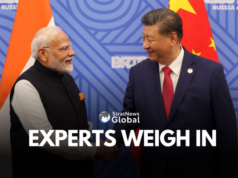US-China relations have been on a roller-coaster it would seem with President Trump announcing across the board tariffs of 145% on Chinese imports, followed by the latter imposing retaliatory tariffs of 125%.
“In the last week of June it was announced that a new deal had been signed and the contours of that deal … have not been released publicly … but it seems there is a sort of broad climb down … something in the range 32% to 55%,” said Paul Fraioli, senior fellow for geopolitics and strategy at the International Institute for Strategic Studies in the US.
Fraioli was a guest on The Gist, analysing the current state of US-China relations and what that could portend for the future.
He was not clear why the details of that deal had not been made public, pointing to “high political sensitivity” as the possible reason why neither capital had made clear what was achieved.
But in his view, “structurally the US had a weaker hand to play. China’s manufacturing economy is vast and the US relies on it at so many levels of the economy. So many of the chips that China makes are kind of low or mid-tier chips that go into refrigerators, toys, cars and toothbrushes.”
Meaning that if trade had come to a halt, there would be massive negative effect in terms of the availability of consumer goods in the US.
In Fraioli’s view, Donald Trump saw the US reliance on China as a major weakness and that the US “should be a manufacturer itself … the US should be a trade power as an exporter not as an importer.”
He notes that Trump’s view of China mirrors his views of Japan in the 1990s, when Tokyo was in the ascendance as an economic power and a manufacturer of advanced technologies.
“I think he has always viewed President Xi with respect … and he views China through the lens of international economics perhaps more than the security lens.”
Tune in for more in this conversation with Paul Fraioli of the International Institute for Strategic Studies in the US.
Thirty eight years in journalism, widely travelled, history buff with a preference for Old Monk Rum. Current interest/focus spans China, Technology and Trade. Recent reads: Steven Colls Directorate S and Alexander Frater's Chasing the Monsoon. Netflix/Prime video junkie. Loves animal videos on Facebook. Reluctant tweeter.




